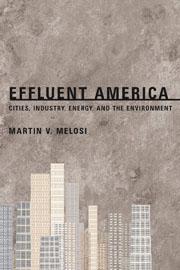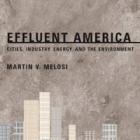Melosi, Martin V. Effluent America: Cities, Industry, Energy, and the Environment. Pittsburgh: University of Pittsburgh Press, 2009.
What’s the difference between an anthill and a city? Protection from weather and predators, living and working quarters, transportation networks, food storage capability—all these they hold in common. And while there are obvious differences between humans and ants, both exist in the same space and time dimension in nature. This simple idea, imagining cities as part of the larger physical world, has driven the work of the historian Martin Melosi for twenty-five years. Melosi is one of a handful of scholars who examine urban history from an ecological perspective, using the city to help define the place of nature in human life. Cities, he maintains, are places where humans live, work, play, consume goods, and make waste—just as humans have in caves, on farms, and in villages. To imagine the city as outside of nature limits what can be known about our past, and our future. Effluent America is a collection of essays spanning this innovative scholar’s career and the growing field of urban environmental history. Melosi charts the development of city services, the rationale for their implementation, and how they affected growth. He explores the environmental impacts of unprecedented methods of production, the influence of new forms of energy, and changing patterns of consumption during the Industrial Revolution and beyond. In so doing, he traces how one of the richest nations in the world became also the most wasteful, a juxtaposition of affluence and effluence. Other essays consider the important role of American cities in the history of the conservation and environmental movements. Melosi sketches the reforms and reformers, born out of such urban ‘quality of life’ issues as pollution, sanitation, public health, and the need for greenspace. He also profiles the environmental justice movement, whose response to environmental problems is a question: Who bears the most risk? Urban environmental history is a window on the past, but it also directly informs issues of the present such as public health, pollution, the role of government in delivering services, etc. Effluent America is an important volume for students of history and urban affairs, as well as for policymakers and all those concerned about the one world we inhabit. (Text adapted from University of Pittsburgh Press website.)
Read the book in full on the University of Pittsburgh Press Digital Editions.



